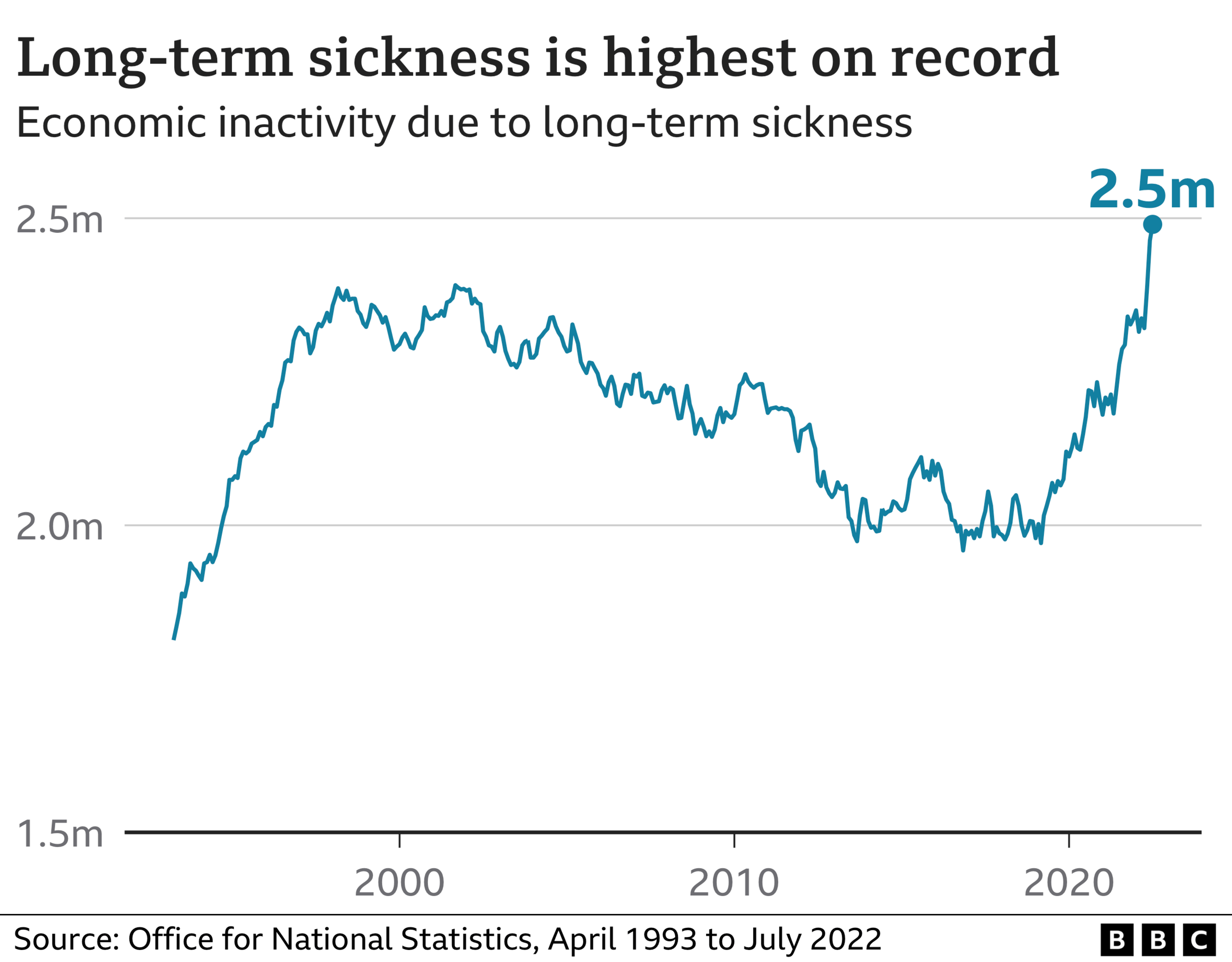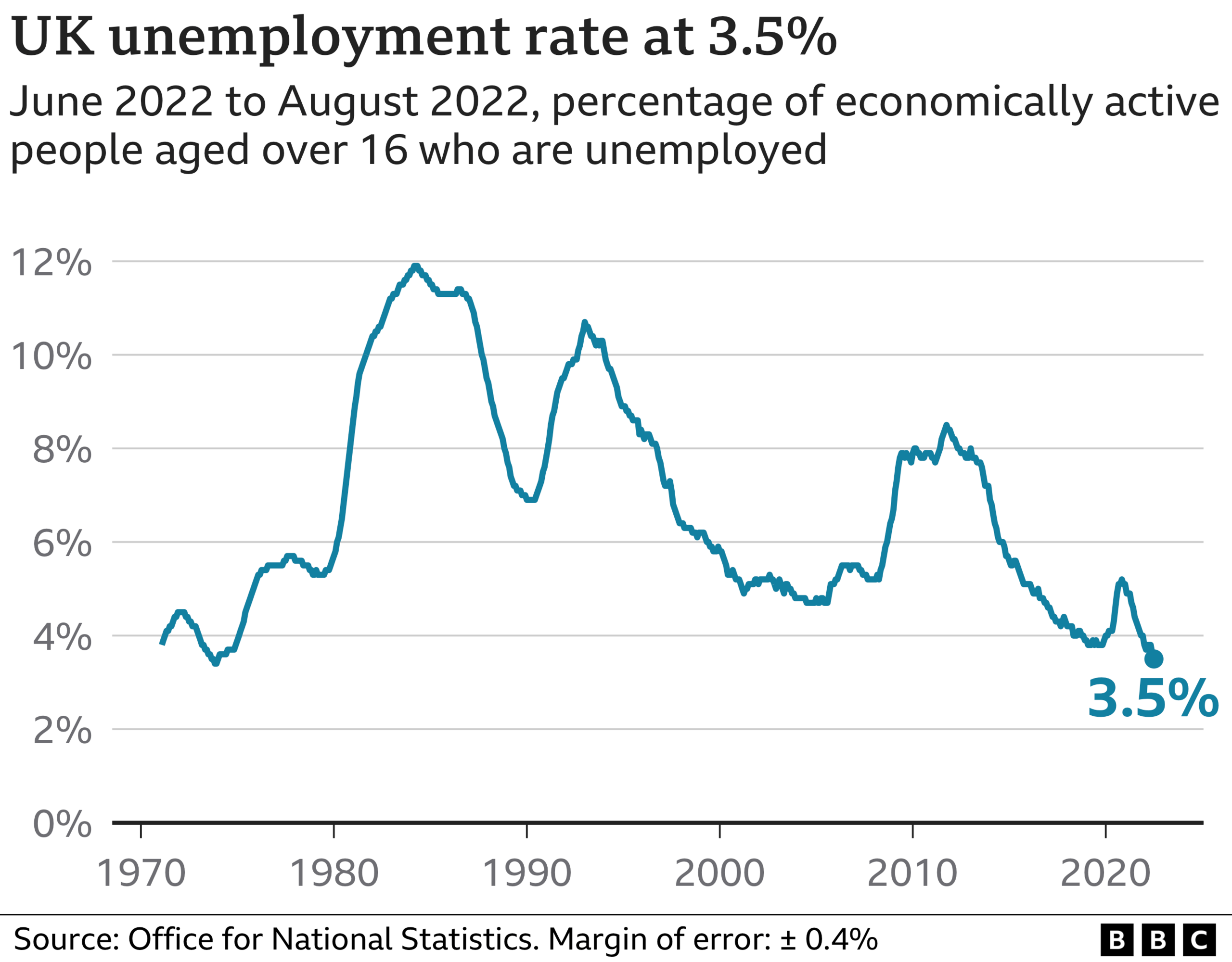Record numbers not looking for work due to long-term illness
- Published
- comments

The number of people not looking for work because they are suffering from a long-term illness has hit a record high, latest official figures show.
The fall in the number looking for work has helped to push the unemployment rate to its lowest for nearly 50 years.
The jobless rate fell to 3.5% in the three months to August, the Office for National Statistics (ONS) said.
The number of job vacancies fell again, although the level still remains high with many firms struggling to recruit.
However, the squeeze on pay remains, with rises in regular wages failing to keep up with the rising cost of living.

Have you left work due to illness?
WhatsApp: +44 7756 165803, external
Tweet: @BBC_HaveYourSay, external
Please read our terms & conditions and privacy policy

ONS head of labour market and household statistics David Freeman said the number of people neither working nor looking for work had continued to rise over the past few months.
The economic inactivity rate - which measures the proportion of people aged between 16 and 64 not looking for work - increased to 21.7% in the June to August period, the ONS said. The number of those inactive because they are long-term sick hit a record high of nearly 2.5 million.

Mr Freeman added: "While the number of job vacancies remains high after its long period of rapid growth, it has now dropped back a little, with a number of employers telling us they've reduced recruitment due to a variety of economic pressures."
The estimated number of vacancies in the three months to September fell by 46,000 to 1,246,000, the largest fall since mid-2020 during the Covid pandemic.
Ruth Gregory at Capital Economics said that while there were "tentative signs that the labour market is cooling from the red-hot conditions seen in recent months, the shortfall in labour supply is keeping it exceptionally tight".
"That will maintain intense pressure on the Bank of England to raise rates aggressively over the coming months," she added.

'Recruitment problems are limiting our growth'

One company still struggling to recruit enough staff is PMG Services, a waste management business based in Bristol. It employs 50 people, but has a vacancies for a wide range of roles.
"We get a lot of interested candidates, we offer interviews, and then we get a lot of no-shows which is really disheartening and wastes so much time," says PMG's Clare McGuinness.
"Some people are offered jobs and don't even show up for work. It's a real challenge," she adds.
The company has also raised salaries to try to help recruitment, as well hold on to its current workers.
She says the ongoing vacancies are making it difficult for the company to take on extra work.
"We've become very lean. We've increased our efficiencies but there's only so much we can do, and it really limits our ability to grow."


The ONS data showed that while wages were seeing strong rises, they were still failing to keep with rising prices.
Regular pay - which excludes bonuses - grew at an annual rate of 5.4% in the June to August period, the ONS said, which is the strongest growth seen outside of the coronavirus pandemic period.
However, inflation - the rate at which prices rise - currently stands at a near 40-year high of 9.9%.
When taking the rise in prices into account, the value of regular pay fell by 2.9% in the three months to August, the ONS said.
Reacting to the figures, the Chancellor, Kwasi Kwarteng, said "the fundamentals of the UK economy remain resilient".
"Our ambitious Growth Plan will drive sustainable long term growth, meaning higher wages and better living standards for everyone, and we are cutting taxes so people can keep more of what they earn," he added.
Related topics
- Published11 October 2022

- Published30 September 2022

- Published13 September 2022
